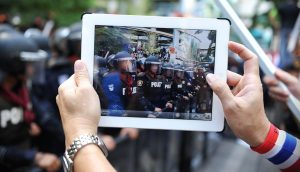 A law enforcement department in Wilmington, NC has been forced to backtrack following an incident in which one of its officers was recorded by a citizen telling him that he could not record their interaction. This particularly unnerving incident once again raises the specter of just how much privacy a law enforcement officer has a right to expect when you consider the current climate in which there is a high demand for transparency, while at the same time balancing this with the need for increased officer safety and the need to investigate any possible misdoings by officers.
A law enforcement department in Wilmington, NC has been forced to backtrack following an incident in which one of its officers was recorded by a citizen telling him that he could not record their interaction. This particularly unnerving incident once again raises the specter of just how much privacy a law enforcement officer has a right to expect when you consider the current climate in which there is a high demand for transparency, while at the same time balancing this with the need for increased officer safety and the need to investigate any possible misdoings by officers.
What Happened
According to reports, on the 26th of February, Sgt. Kenneth Becker of the Wilmington PD was recorded telling Jesse Bright that under a new state law, it was no longer legal to record police officers acting in the line of duty. The problem is that there is no such law on the books, Bright who is an attorney questioned the officer as the validity of this statement, knowing full well that none existed. During the interaction, Bright informed Becker that he was “scared” and that he wanted to continue “recording in case anything happened.” During the stop, Bright’s car was searched after being told a K-9 unit had detected drugs. Bright told local news station WECT that he was released after the officers found no sign of drugs.
Ralph Evangelous, Wilmington Police Chief, released a statement to say that an investigation had begun into the event and that all citizens do in fact have the right to record officers acting in the line of duty. His statement said, ” Taking photographs and videos of people that are in plain sight including the police is your legal right. As a matter of fact, we invite citizens to do so when they believe it is necessary. We believe that public videos help to protect the police as well as our citizens and provide critical information during police and citizen interaction.”
What the Laws Truly Say and Mean
While House Bill 972 that took effect back in October does make all footage from police body cameras and dash-cams private in the state of North Carolina, it does not cover any footage not created by a private citizen on their own equipment. While this might seem like a good idea, it adds yet another major mess into the melting pot that has become a huge issue with regard to the growing demands for both more transparency and the need to protect the privacy of police officers.
There is no doubt that across the country, the laws covering the use of video cameras by officers and civilians alike are a mess. Unfortunately, there have been far too many instances of violence against officers following the public release of footage like this. This makes critics highly wary of any laws designed to block public access while at the same time of making this type of footage public knowledge. It is a double-edged sword and one that is likely to plague law enforcement agencies for many years to come.
Bottom line at the moment is that until definitive laws are passed, the public still retains the right to actively film any law enforcement officer in the line of duty. At least unless filming police officers in the line of duty will actively hinder an ongoing investigation. So officers take heed, the public has the right to videotape you and currently, there is nothing you can do about it.
